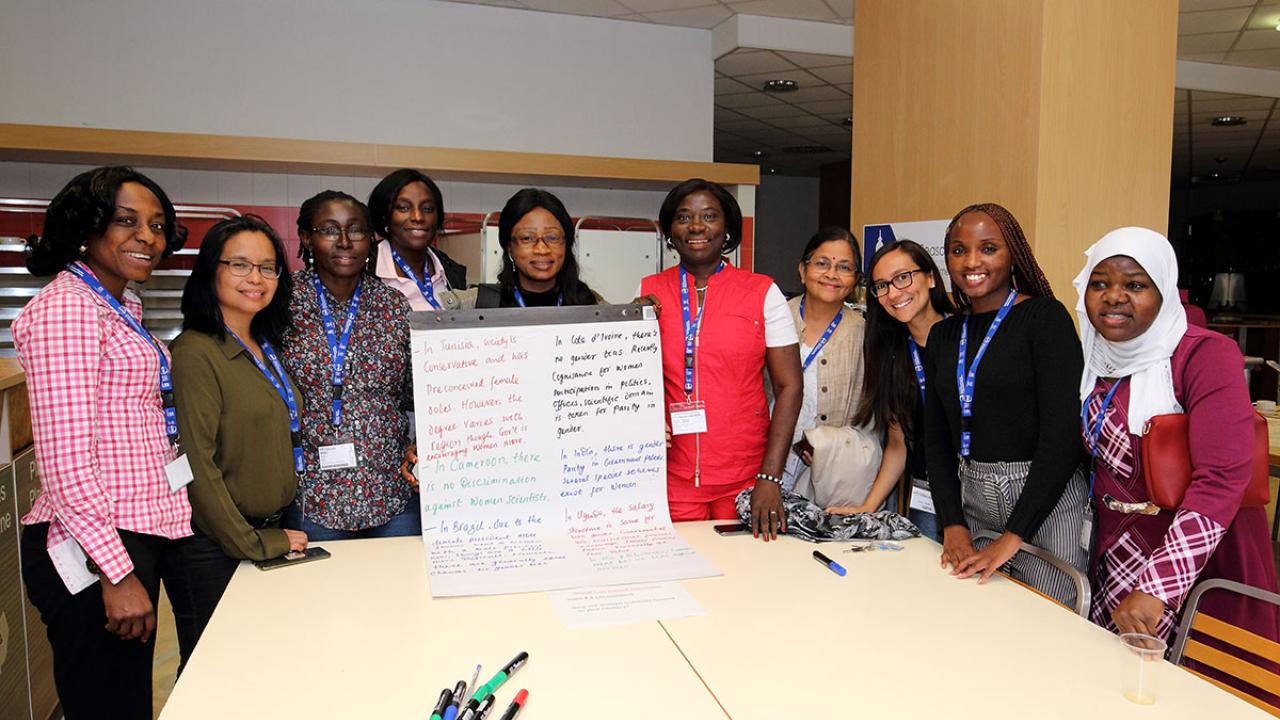
In the world of science, particularly in disciplines like physics, there are fewer women compared to men. Despite the incredible talents and potential of women in science, they remain a minority in these fields, occupying only about 30% of scientific research roles globally. This gap is a long-standing challenge; the reasons for this are diverse and deeply rooted, ranging from societal expectations and unconscious biases to a lack of supportive networks and role models. How can we actively work to bridge this gap and create a more equitable society?
Recognizing the importance of fostering gender diversity and inclusivity in science, ICTP organizes several activities and initiatives aimed at increasing the participation and representation of women in physics. One of the standout activities is the Career Development Workshop for Women in Physics, which will kick off a new edition at ICTP from 6 to 10 November 2023. The workshop combines a variety of highly interactive exercises, talks, panel discussions, skill-enhancing training sessions, and other activities designed to empower women in physics. Its mission is to provide a safe and bias-free environment where women can share their experiences, gain self-confidence, and acquire the skills necessary for career success. The driving forces behind this workshop are Shobhana Narasimhan, from the Jawaharlal Nehru Centre for Advanced Scientific Research in Bangalore, India; Elizabeth Simmons, from the University of California, San Diego; and Erika Coppola, the local organizer from ICTP.
The workshop's origins trace back to a profound need for change. “We discovered that being a woman in physics was often a challenging and isolating experience. Our colleagues’ lack of support and the hostile environment were disheartening,” shares Narasimhan. The need to create a platform where women could connect, share their challenges, and empower each other became evident. “I wanted to do a workshop for women in physics where they can support each other. I had been an associate at ICTP and therefore I thought: maybe I can do it at ICTP,” Narasimhan explained. That’s how the idea of the workshop started to form.
Establishing the workshop was no easy task, as some within the ICTP community believed that these activities deviated too much from the traditional focus on scientific topics. However, thanks to the support of key ICTP scientists like Erio Tosatti, Sandro Scandolo, and former ICTP Director Fernando Quevedo, they succeeded in getting the initiative approved. More importantly, they managed to convey that gender equity is also part of ICTP’s mission and mandate.
The first edition of the workshop took place in 2013, and its impact has been profound. Participants from about 80 countries attended, with a special focus on nurturing the growth of young women scientists at the early stages of their careers. The organizers were not only surprised by the high turnout but also deeply touched by the stories shared by the participants. Narasimhan recalls and shares the perspective of a participant from the first edition: “This is the first conference of any kind that I have attended because it’s the first one my husband allowed me to go to. He permitted me to attend this event under the condition that only women would be present. If men were there, he wouldn’t have allowed me to come.” There is a whole range of experiences, and this highlights the constraints within which women often operate.
In addition to skill-building activities, the workshop features talks by inspiring women who serve as role models. For example, Jocelyn Bell Burnell was a speaker at the 2015 workshop. She is known for her discovery of pulsars during her graduate studies, despite her male advisor refusing to believe her results. She shared her journey, including the difficulty she faced in securing a postdoctoral position due to her advisor’s negative assessment of her physics abilities.
“Many women have attested that the workshop increased their confidence, both as individuals and as physicists. After the workshop, they became aware that they were not alone in their struggles; they found support in the shared experiences of other women facing similar challenges,” says Narasimhan.
The workshop has been a repository of impactful stories, each a testament to the remarkable resilience of women in the field. These stories include a physicist who attained her PhD at the age of 40, another who juggled raising six children while gradually earning her PhD, and one who forged a highly successful career in the industry. These stories illustrate the determination of women in this sphere to persevere despite obstacles. The ICTP Career Development Workshop for Women in Physics stands as a beacon of hope and unity. It reinforces the notion that women need not navigate this challenging terrain alone. As one participant said, “Sometimes I think that I am alone, but this workshop is a good antidote to that feeling.”
















